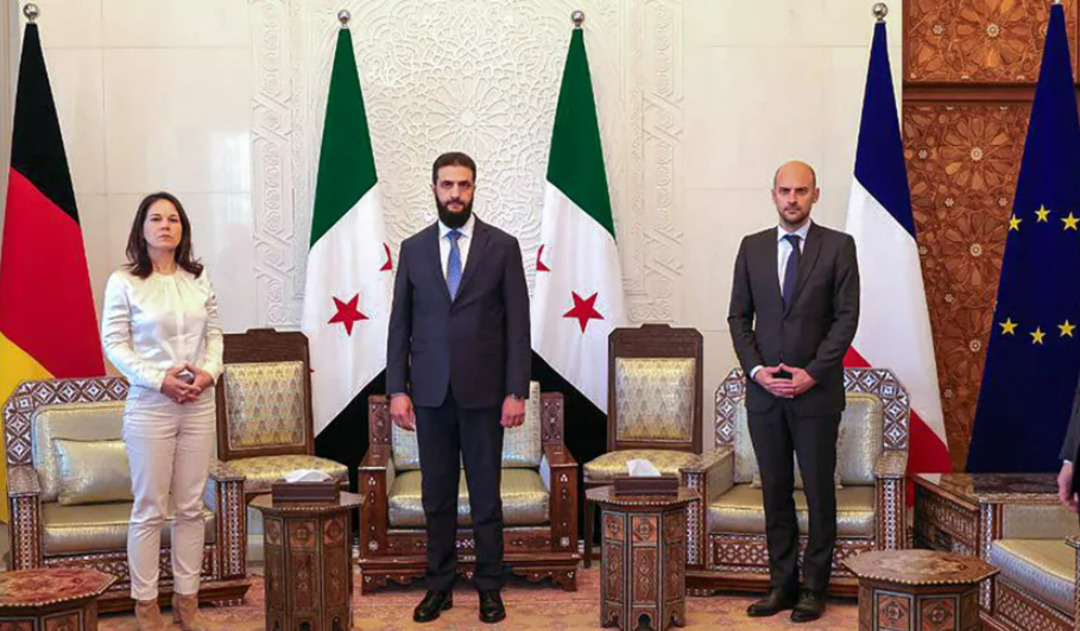-
Political Transformations in Syria: Conditional European Support for Rebuilding Partnerships

The Syrian landscape is witnessing a significant transformation with the increasing European presence in political events, following a visit by a delegation of prominent leaders from France and Germany to Damascus. This visit is seen as support for the new Syrian administration, but it comes with conditions related to political transition and inclusivity in representing various components of the Syrian people.
German Foreign Minister Annalena Baerbock revealed from Damascus that European countries will not give money to new Islamic structures.
Baerbock said from the Syrian capital, Damascus: "The leader of the Syrian administration, Ahmad Al-Sharaa, told us that Europe will not give money to new Islamic structures," according to "Reuters."
She added: "Europe will support the country, but Europe will not be a sponsor of new Islamic structures."
Baerbock stressed the need to involve all sects in the reconstruction process in #Syria, noting that there is a need for reliable security guarantees for the Kurds in Syria.
These developments coincide with a critical transitional phase within Syria, where security, political, and economic challenges necessitate collective efforts to achieve actual stability. The visit of the French and German foreign ministers embodies Europe’s active desire to contribute to Syria's future.
In statements by Ahmad Bakour, a member of the political body of the Syrian National Coalition, he pointed out that the visit instills "optimism," but this is conditional on the fulfillment of several fundamental requirements, including the implementation of a genuine political transition and the formation of a technocratic government that includes all Syrian components.
Bakour also discussed the importance of the transitional phase in his conversation with the "News Room" program on "Sky News Arabia," emphasizing the need to achieve comprehensive consensus within Syria, including a focus on northern cities such as Raqqa and Al-Hasakah in the political process.
For his part, political activist Ali Muhammad Sultan considered that Europe has sent a "message of support" to the new administration, highlighting Europe’s conviction regarding the changes following the fall of the previous regime. Nevertheless, he stressed the importance of avoiding the imposition of strict conditions and instead offering proposals that contribute to strengthening partnerships and fulfilling the people's aspirations.
Political philosophy professor Dr. Rami Khalifa al-Ali emphasized that European support is "not unconditional" and requires tangible steps on the ground, especially concerning the formation of a participatory government that accommodates all parties. He noted European concerns about the continued Russian influence in Syria, which adds new challenges for the new Syrian administration.
Tags
You May Also Like
Popular Posts
Caricature
BENEFIT Sponsors BuildHer...
- April 23, 2025
BENEFIT, the Kingdom’s innovator and leading company in Fintech and electronic financial transactions service, has sponsored the BuildHer CityHack 2025 Hackathon, a two-day event spearheaded by the College of Engineering and Technology at the Royal University for Women (RUW).
Aimed at secondary school students, the event brought together a distinguished group of academic professionals and technology experts to mentor and inspire young participants.
More than 100 high school students from across the Kingdom of Bahrain took part in the hackathon, which featured an intensive programme of training workshops and hands-on sessions. These activities were tailored to enhance participants’ critical thinking, collaborative problem-solving, and team-building capabilities, while also encouraging the development of practical and sustainable solutions to contemporary challenges using modern technological tools.
BENEFIT’s Chief Executive Mr. Abdulwahed AlJanahi, commented: “Our support for this educational hackathon reflects our long-term strategic vision to nurture the talents of emerging national youth and empower the next generation of accomplished female leaders in technology. By fostering creativity and innovation, we aim to contribute meaningfully to Bahrain’s comprehensive development goals and align with the aspirations outlined in the Kingdom’s Vision 2030—an ambition in which BENEFIT plays a central role.”
Professor Riyadh Yousif Hamzah, President of the Royal University for Women, commented: “This initiative reflects our commitment to advancing women in STEM fields. We're cultivating a generation of creative, solution-driven female leaders who will drive national development. Our partnership with BENEFIT exemplifies the powerful synergy between academia and private sector in supporting educational innovation.”
Hanan Abdulla Hasan, Senior Manager, PR & Communication at BENEFIT, said: “We are honoured to collaborate with RUW in supporting this remarkable technology-focused event. It highlights our commitment to social responsibility, and our ongoing efforts to enhance the digital and innovation capabilities of young Bahraini women and foster their ability to harness technological tools in the service of a smarter, more sustainable future.”
For his part, Dr. Humam ElAgha, Acting Dean of the College of Engineering and Technology at the University, said: “BuildHer CityHack 2025 embodies our hands-on approach to education. By tackling real-world problems through creative thinking and sustainable solutions, we're preparing women to thrive in the knowledge economy – a cornerstone of the University's vision.”
opinion
Report
ads
Newsletter
Subscribe to our mailing list to get the new updates!






















